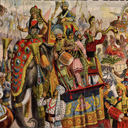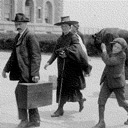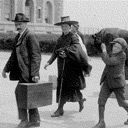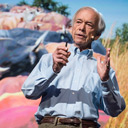
Welcome to the main artery into creative or elite work—highly pressurized, poorly recompensed, sometimes exhilarating, more often menial. From the confluence of two grand movements in American history—the continued flight of women out of the home and into the workplace, and the rise of the “creative class”—the personal assistant is born.

From the late nineteenth century to our post-9/11 era, Americans have imagined South Asians simultaneously as exotic and barbaric, magical and menacing—to the detriment of those immigrants who are already most vulnerable.

Featuring essays by Vivek Bald, Michelle Chen, Anjali Kamat, Mae Ngai, and more, our Spring issue examines the power of borders—real and imagined—and what they look like from the perspective of those they seek to exclude.

Nearly every morning, hundreds of immigrants from Latin America come to my affluent town in the suburbs of Washington, D.C. to work. They build or clean million-dollar houses, cook and wash dishes at fast-food and fancy restaurants, care for the …

There was the plantation boss, she remembered. A very decent man, really, even if it’s true there was a killing connected to him. It seems he had done it, she remembered, that was the connection. . . .
A short story.

Sonic Youth’s DIY ethic couldn’t sustain itself in the face of a corporate world eager to market youthful anger like any other commodity. But Kim Gordon’s remarkable new book shows that no matter how institutionalized it became, punk offered a radical way of seeing the world.

As “eds and meds” reshape working-class New Haven, labor and community groups are joining forces to transform the service economy and build a more democratic city.

Corruption today represents not a failure of individual ethics, as the Supreme Court renders it, or a side-effect of poorly designed laws, but an intensifying standoff between capitalism and democracy.

In a twisted parallel to the country’s long tradition of masked luchadors, Mexico’s cartel leaders have carved out their own traditions of anonymity.

An optimistic environmentalist may sound like an oxymoron (or perhaps just a moron). Yet a growing number of greens are putting a positive spin on our planetary emergency. Should more of us start thinking like them?

Since 1989, thousands of theme parks have been built across China, in an uncanny reflection of the country’s economic liberalization.

If being an academic today is a profession, it’s one that is, for the vast majority, almost bereft of professionalism’s worldly benefits.

Is it possible that ISIS appeals to some Muslim women not because they are fooled by it, but because its political vision seems to offer solutions to some of their problems?
Followed by a debate.

Both law and history are on Obama’s side when it comes to executive action on immigration.

Whither the U.S. Protestant left?




















